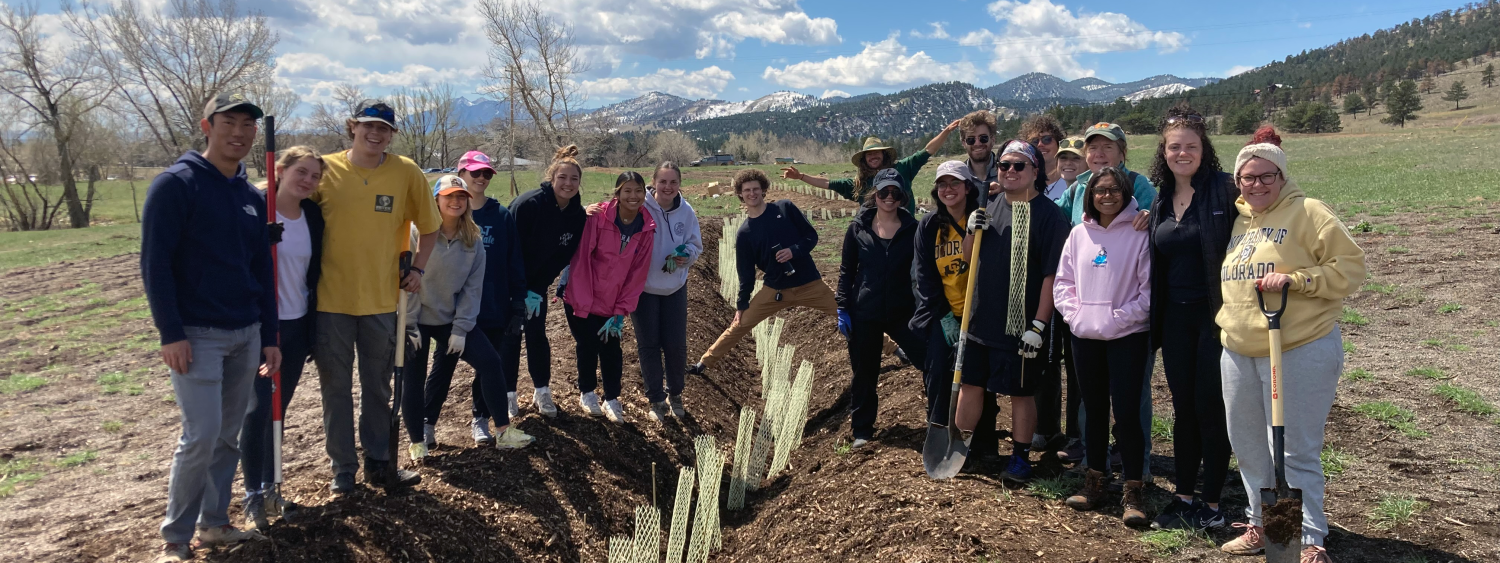Sustainability

The US’s first STARS gold member of the Association for the Advancement of Sustainability in Higher Education (AASHE), the University of Colorado at Boulder is committed to sustainability in our practices as a campus, in our research, and in our curriculum. To further these goals, the Program for Writing and Rhetoric has dedicated itself to providing interested students with sustainability-based classes. We teach courses at the first-year and upper-division level that consider sustainability in various media: in print, on film, on the Web, in art, in fact, and in fiction.
The Program for Writing & Rhetoric’s Sustainability Committee
Under the leadership of director Dr. Laurie Gries, the Program for Writing and Rhetoric (PWR) continues to be an important force promoting sustainability at CU Boulder and in the local community. PWR first established the Sustainability Committee in 2009; since then, the committee has strived to incorporate sustainability-related issues into writing courses, rhetoric classes, and specific projects within the program. This integration helps students better understand environmental concerns as they work on honing their writing and building their ability to make savvy rhetorical choices.
In a PWR class with a sustainability-based curriculum, students might read articles on sustainability from sources like The New York Times, The Wall Street Journal, Atlantic, and other mainstream sources to discuss and write about content and method while considering how effectively the articles present sustainability concerns. Students also investigate peer-reviewed scientific articles on sustainability issues to see how science works to understand the Earth’s processes and how scientists talk about such issues within their own community. Students might also analyze videos, blogs, podcasts, documentaries, and other digital media on environmental issues. Through examining these different sources of information, students become familiar with knowledge formation and dissemination, both trustworthy and untrustworthy. Among other things, this curriculum asks students to consider the mechanics of an effective argument as they learn how to find credible and persuasive evidence to support their own stances, whether writing about sustainability issues or other topics.
The Sustainability Committee consists of 4-7 PWR faculty, as well as a number of sustainability supporters (staff and students). At least 20 of PWR’s teachers are using a sustainability-based curriculum as they work with the 7,000 students who pass through PWR classes each year.
Local Programs
The Sustainability Committee sponsors and organizes programs and panels that help educate CU students, faculty, and staff about sustainability concerns; the general public is often also invited to these events. Recent topics have included topics that have drawn large audiences (of over 150 attendees). A few events we have sponsored:
- Can Geoengineering Save Us? An Educational Panel, 2025 (coming in March, 2025)
- Regenerative Agriculture, 2023 (in person)
- Human Health and Climate Change, 2022 (in person)
- Viruses, Vaccines, and Environmental Degradation: A Conversation with Dr. Peter Marks, director of the Center for Biologics Evaluation and Research for the Food and Drug Administration, 2021 (virtual presentation)
Volunteer Work
For more than 15 years, PWR faculty have organized and led student volunteer projects, working on the land to plant trees, rehabilitate damaged areas (as a result of wildfires or flooding), thin overcrowded forests, plant wildflowers, and more. We have worked with Boulder County Open Space, City of Boulder Parks and Open Space, and local regenerative farmers.
Community and campus awards:
- 2016 Boulder County Park and Open Space Outstanding Partner Award (for consistent and high-quality open space rehabilitation work)
- 2012 Campus Sustainability Award (for sustainability-based curriculum and land rehabilitation work and working to reduce CU Boulder’s impacts on the local environment)
Other awards:
- 2024 Drylands Agroecology Research Earth Day award (for tree-planting)
- 2023 Drylands Agroecology Research Earth Day award (for tree-planting)
- 2023 Boulder County Parks and Open Space Partner (for tree thinning)
- 2019 Boulder County Parks and Open Space Outstanding Alpine Partner Award
- 2018 Boulder County Parks and Open Space Outstanding Alpine Partner Award
- 2017 Boulder County Parks and Open Space Outstanding Alpine Partner Award
- 2016 Boulder County Parks and Open Space Outstanding Alpine Partner Award
- 2015 Boulder County Parks and Open Space Outstanding Alpine Partner Award
- 2014 Boulder County Parks and Open Space Outstanding Alpine Partner Award
- 2013 Boulder County Parks and Open Space Outstanding Alpine Partner Award
- 2012 Boulder County Parks and Open Space Outstanding Alpine Partner Award



